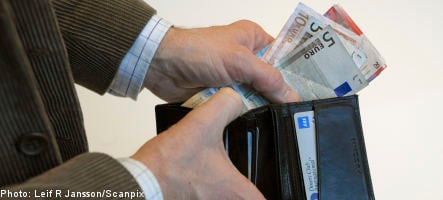Businesses in Gotland and Norrbotten are particularly open to customers carrying euros, according to a new survey of shops, hotels, restaurants and tourism-related companies by Swedish business group Företagarna. Of 602 companies questioned, 60 percent said they accepted euros. Hotels and restaurants were significantly more likely than shops to accept the European currency.
Areas near land borders were generally more accepting of the euro than other areas. In Haparanda, on the Finnish border, there were almost no stores that said they would turn down payment in euros. Even in Luleå, 130 kilometres from the border, many traders accepted the currency. In Norrbotten county, where Luleå and Haparanda are situated, and in Gotland, around two-thirds of companies polled said they took euros. Companies told Företagarna that they took the euro because it was what customers wanted.
Företagarna’s CEO, Anna-Stina Nordmark Nilsson, said the survey showed that there would be advantages to Sweden joining the euro:
“Despite the fact that Sweden remains outside the eurozone, the euro has in practice made inroads in parts of the country. It would simplify things for companies if the euro was introduced in the whole country,” she said.
Despite the high acceptance rate for the euro, relatively few customers used the European currency for transactions. Just a third of companies that accept euros in Gotland and Norrbotten said they received payment in the currency at least once a month.
The survey did not reveal whether customers were getting a good deal when paying in euros, or whether businesses were making a tidy profit when changing the cash into kronor. More than 75 percent of businesses said the cost of handling two currencies was small or non-existent.



 Please whitelist us to continue reading.
Please whitelist us to continue reading.